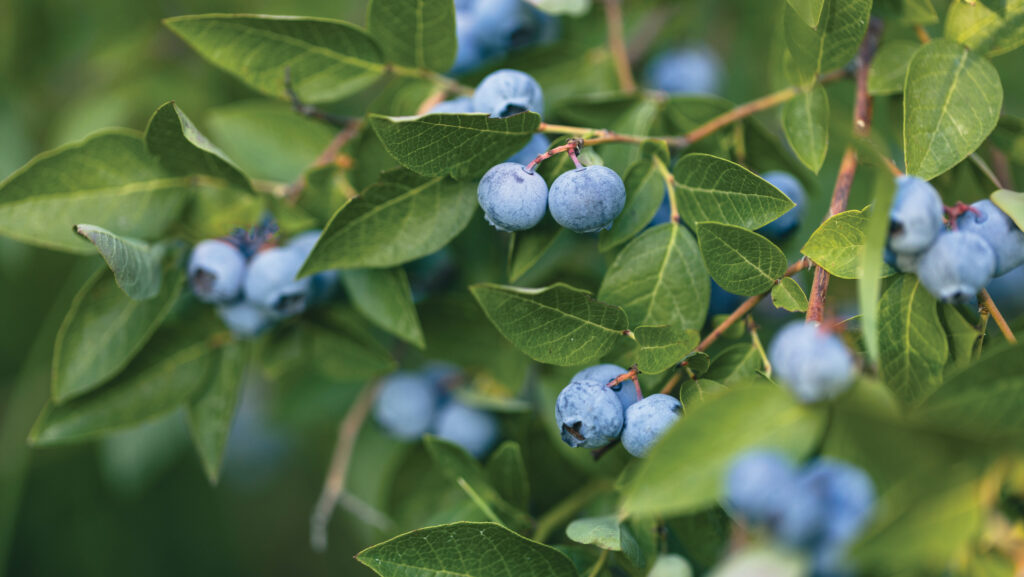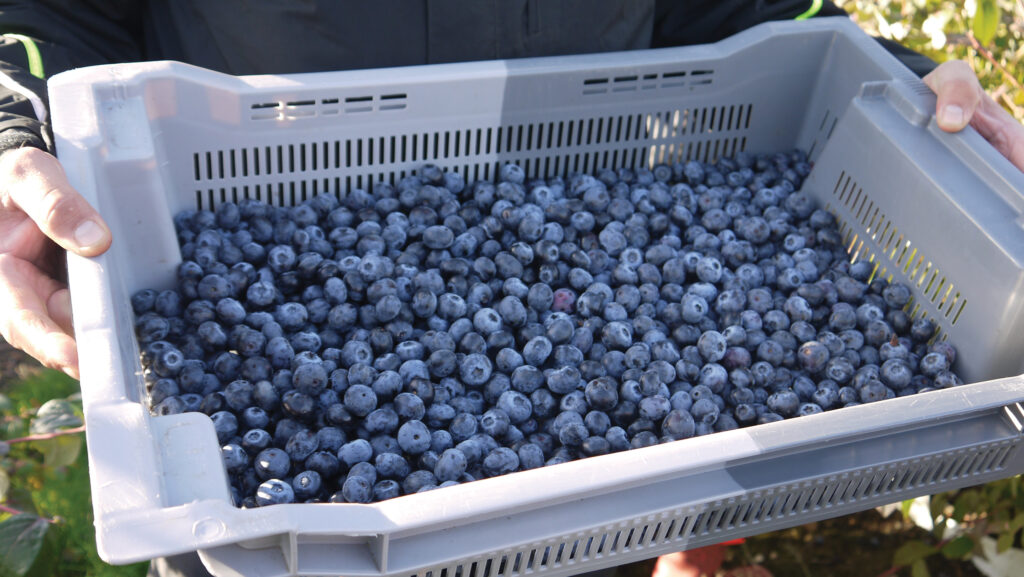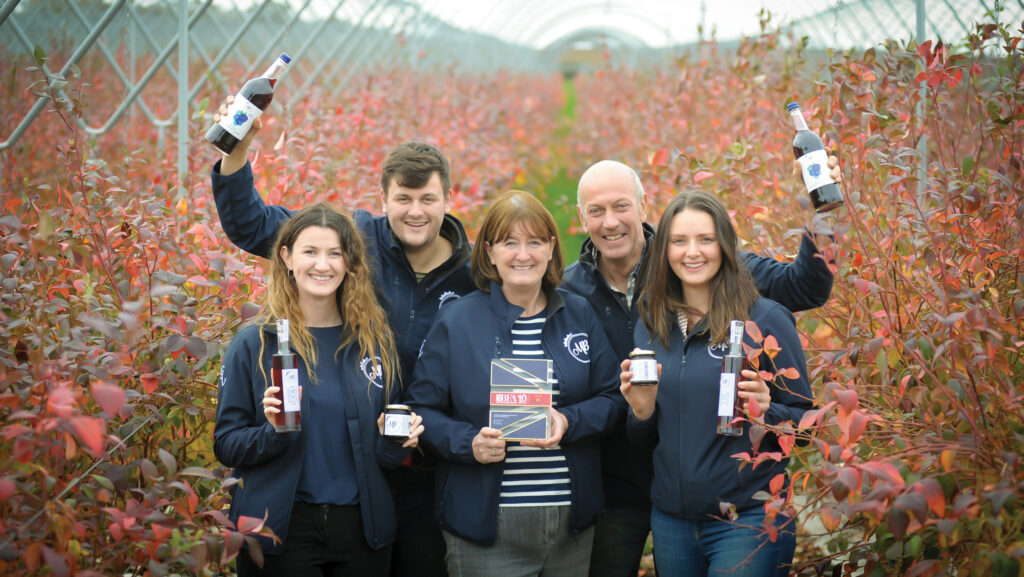Why blueberries are working well for Northants arable farm
 © Adobe Stock
© Adobe Stock The search for a diversification project that could make use of an existing irrigation abstraction licence, along with a desire to support the next generation, led to the Mee family becoming a leading producer of British blueberries.
Back in 2010, a suggestion by their agronomist that blueberries might meet their requirements for a new enterprise on the Northamptonshire farm was followed up by Peter and Zoe Mee, who were also looking for a crop with a growing market.
Potatoes were ruled out, as a woody nightshade problem on the nearby River Nene meant that the water was an infection source of brown rot. Blueberries, with their suitability for trickle irrigation and minimal British supply at the time, fitted the bill.
See also: Wildflower seed diversification gives arable tenants security
With two children, Charlie and Emily, keen to join the business and have careers in farming, the decision was made to start a new enterprise and run it alongside their existing arable and third-party storage business.
Starting from scratch
As a result, the first blueberry plants went into the ground in 2014 and Mee Blueberries was born.
“At that time, we knew nothing,” recalls Zoe. “Our agronomist and the bank were very helpful, as was the support from becoming part of the fruit co-operative, Berry Gardens Growers.”
The up-front costs were huge, so an eight-year cashflow for a four-year project was required. The first fruit wasn’t picked until year three, when yields were just 150g/plant. Today, they are 3.5-5kg/plant, following careful management and pruning for fruit size and quality.

© Mee Family
“The sharing of knowledge from other growers has made a huge contribution to where we are now,” she adds. “We learned each stage of blueberry production from them as we went along.”
On the family farm at Nassington, near Peterborough, there are 15ha of blueberries grown in tunnels, while a joint venture with another fruit grower saw them expand the total crop area to 85ha in 2024 – producing 700t of fruit this year.
Put another way, that’s more than 4.5m 150g-size punnets of blueberries.
British produce
At the outset, the Mees were also aware that the demand for blueberries was increasing, while most of the existing blueberry supply was coming from Eastern Europe, South America and South Africa.
After three years of budgeting, getting support from their bank and a grower co-operative, they started planting. The initial 15ha was planted over four years, to spread the investment cost, with the first year’s plantings providing their first fruit as the year-four plants went into the compost beds.
In 2019, the family took the decision to invest in their own packhouse and grading facilities. This gave them more control and helped to make the operation more efficient.
“It also allowed us to control any waste,” explains daughter Emily Mee, who is now business development manager and has overseen the production of blueberry-based jams and conserves, as well as liqueurs, sparkling wine and fresh juice – or, as she puts it, products that celebrate the British blueberry.
Of the 184t of fruit picked on the home farm, some 22t is termed as waste.
“By that, we mean fruit that isn’t ripe or isn’t fit for consumption, due to damage,” she says.
“However, 50% of that is fruit that wouldn’t have a five-day shelf life, so it is frozen. It has the best flavour and the nutrients are protected, so it is used for our product range.”
Award-winning products
Extracting some value from that waste – rather than it all going as pig feed – has been key. Great Taste Awards have followed, as has recognition in national and regional competitions, with the range expanding to include balsamic vinegar, honey and ice cream.
Covid restrictions were the initial prompt for selling frozen fruit to the local community.
“We sold 3t of fruit in 2kg bags when we first started doing deliveries in 2020,” recalls Emily. “It proved that we had a supportive community on our doorstep.”

The Mee Farmers team © Mee Family
As restrictions eased, the farm started opening a pop-up shop on site, which still operates every other Saturday from 10am-12pm.
Emily also sells the blueberry product range in local outlets, farm shops and by attending selected Christmas fairs and food markets. Online sales are also booming, through a dedicated website.
Otherwise, the marketing of the fresh fruit to major retailers such as M&S and Lidl is done by Driscolls, on behalf of the grower-owned co-operative, Berry Gardens Growers.
Bumps along the way
The Covid pandemic also gave them labour challenges, with half the workforce made up of British staff in 2020 following a last-minute recruitment effort. Almost all of the work in blueberries is done by hand, making skilled labour crucial.
Initially their workforce came from Bulgaria, but Ukrainians and other nationalities have featured recently, with agencies used to supply staff and static caravans providing on-site accommodation.
Other challenges encountered by the Mees are familiar ones. Cashflow pressures, energy costs, rising input costs, falling prices, market volatility and technical know-how are all issues. When they started, Brexit hadn’t even been talked about.
“Like all farmers, we’ve had to cope with the shocks associated with events such as Brexit, Covid and the Ukrainian war,” points out Emily.
“Now we have to get our heads round what the Budget means for our business. Starting with massively increased labour costs in 2025 and long-term planning for potential tax liabilities.”
Administrative load
Being part of a supermarket supply chain is more onerous in terms of audits and paperwork than it is with combinable crops, she adds.
Although Leaf and Red Tractor accreditation is required, they also have an unannounced British Retail Consortium audit for the packhouse.
“There are ethical audits too, with a [Sedex Members Ethical Trade Audit] Smeta audit being undertaken bi-annually to ensure worker welfare is protected.”
As with most farming activities, sustainability is increasingly important.
Biological control is used wherever possible, spot spraying is carried out and regenerative practices are in place on the farm.
Bees are bought in to aid pollination, with 120 triple hives of bumblebees and 18 honeybee hives used this year. Six different blueberry varieties are grown, giving them a four-month harvest period, from mid-June to mid-October.
Even though this clashes with the cereal harvest, the enterprise has been a good fit. In a year that saw winter wheat yields dip by as much as 7% nationally, blueberries yielded well in 2024.
“They balance each other nicely.”
What’s next?
Recent political events and rising costs mean the Mee family are having to give some serious thought to investment plans.
“Our costs are going up, there’s always pressure on prices and the Budget has created more uncertainty,” says Zoe Mee. “Our labour bill is going to be much higher next year and we don’t know what’s still to come.”
They acknowledge that others are facing the same dilemma and that it is not an issue unique to blueberries.
“We’ve done everything that we can in terms of agri-environment schemes, building business resilience and spreading risk.”
Diversification advice
Asked for their top tips for diversification, the Mees came up with the following:
- Look for support networks and make good use of them
- Do something you will enjoy
- Consider your under-utilised resources
- Accept that there will be challenges to overcome
- Good planning is essential
To buy blueberry-based products from the Mee family, visit meeblueberries.co.uk

